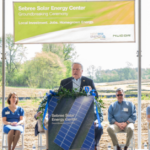Princeton University to study carbon-free energy transition with solar developer input
Solar and wind project developer Community Energy and Princeton University’s Andlinger Center for Energy and the Environment have entered into a joint academic-industry research partnership to study the U.S. energy transition and identify an optimal buildout plan for scaling carbon-free power over the next decade to meet climate challenges.
The research team will develop a technical blueprint for rapid and affordable emissions reductions to the grid while securing reliable electricity supply. The work will focus first on the PJM system, the grid that controls electricity flows for all or part of 13 states, including Pennsylvania, New Jersey and Maryland.
“We are thrilled to partner with Community Energy and investigate questions that the industry faces on the national energy transition. The partnership exemplifies how the Andlinger Center translates new knowledge to be useful for practitioners,” said Barry Rand, associate director for external partnerships at the Andlinger Center. “The company’s perspective will bolster our efforts to provide meaningful insights on how the grid could become low-carbon and which technologies we need to scale to get there,” said Rand, who is also an associate professor of electrical engineering and the Andlinger Center for Energy and the Environment.
The research will be led by Jesse Jenkins who runs Princeton’s Zero Carbon Energy Systems Research and Optimization (ZERO) Laboratory, in collaboration with the Andlinger Center’s Energy Systems Analysis Group. Jenkins is an assistant professor of mechanical and aerospace engineering and the Andlinger Center for Energy and the Environment at Princeton.
“Community Energy will be a good partner because they know the important tradeoffs and practical challenges in renewable energy development,” said Jenkins. “Knowledge of land use, development constraints and synergies with agriculture and farmland preservation will help our research team develop computer models of the grid that are more realistic and achievable in the near term.”
Community Energy will be the first renewable energy company to work with the center through Princeton E-ffiliates Partnership, the corporate membership program of the Andlinger Center. The partnership represents the first research collaboration with a university for Community Energy.
“A whole new solid-state grid needs to be built, and Princeton’s Andlinger Center is unique in its ability to combine fundamental scientific research and practical outcomes in a realistic plan to do that,” said Brent Alderfer, CEO and co-founder of Community Energy. “We are really pleased to be partnering with Princeton’s deep academic arsenal to develop a smart industry investment plan to meet the climate change challenge in the next 10 years.”
The second phase of work with Princeton will assess and identify key policies that will be important to incent the necessary power resources.
“Cross-sector partnerships like these are crucial to accelerate development of clean energy projects at the scale necessary to effectively address the climate crisis,” Alderfer said.
News item from Princeton
<!–
–>
Original Source: https://www.solarpowerworldonline.com/2020/08/princeton-university-to-study-carbon-free-energy-transition-with-solar-developer-input/












